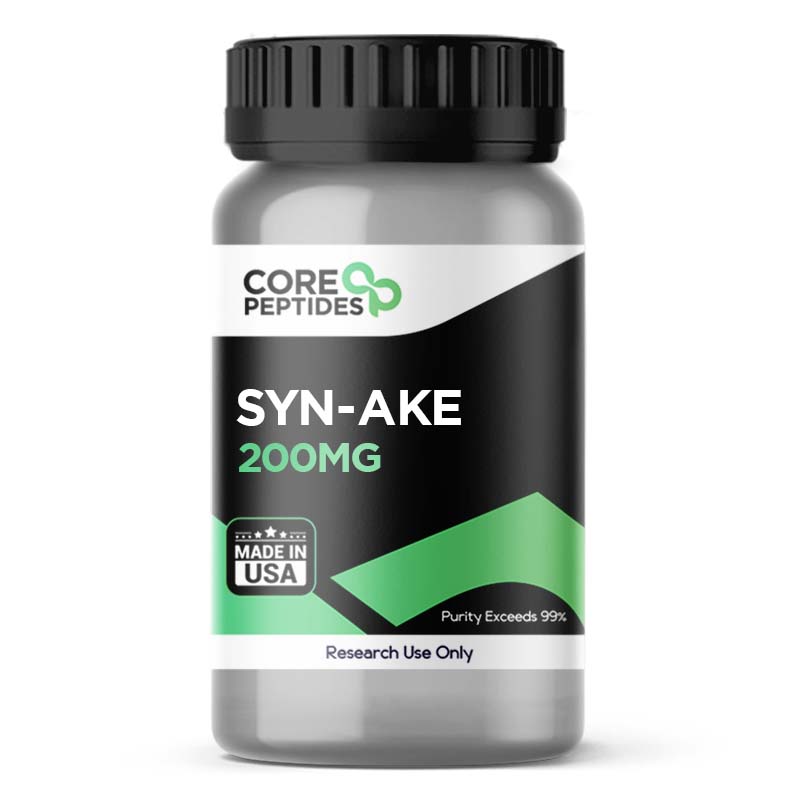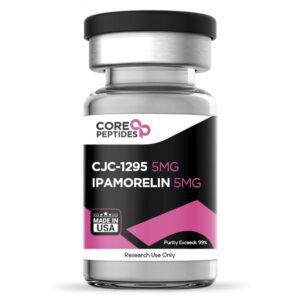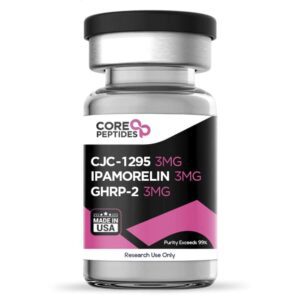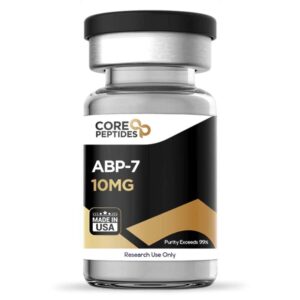Description
Syn-AKE Peptide – Advanced Anti-Wrinkle Research Compound
Syn-AKE, also known as Tripeptide-3, is a synthetic peptide engineered to replicate the effects of Waglerin-1, a polypeptide found in temple viper venom known for its muscle-relaxing properties. Its chemical structure—composed of alanine, proline, and diamino butyrate—is designed to temporarily reduce muscle contractions, leading to visibly smoother, more youthful-looking skin in test applications.
What is Syn-AKE?
Syn-AKE is a lab-developed tripeptide (C₂₃H₃₇N₅O₇, molecular weight 495.57 g/mol) formulated to mimic the muscle-inhibiting action of Waglerin-1, but in a safer and more stable form. It functions by targeting nicotinic acetylcholine receptors (nAChRs) at the neuromuscular junction, preventing acetylcholine from triggering muscle contractions. This temporary inhibition helps reduce fine lines, expression wrinkles, and visible skin tension in research settings.
Unlike its natural counterpart, Syn-AKE does not affect GABA receptors, minimizing potential neurological risks. Its reversible mechanism ensures muscle relaxation without long-term interference, making it a valuable compound for ongoing anti-aging research.
Mechanism of Action
Research indicates that Syn-AKE may reduce muscle cell contractions by up to 82% within two hours of exposure in experimental models. By blocking the transmission of nerve signals responsible for facial movement, it helps smooth skin appearance, particularly in areas prone to expression lines such as the forehead, eyes, and mouth.
Studies have also suggested that consistent application in test subjects may reduce wrinkle depth by up to 52% after 28 days, demonstrating both immediate and cumulative anti-aging potential.
Research Insights
-
Immediate and Long-Term Effects: In clinical studies involving 37 female participants aged 33–45, Syn-AKE showed measurable wrinkle reduction after just one day, with continued improvement over a 3-month period.
-
Comparative Efficacy: In a 45-participant study, Syn-AKE outperformed control peptides and placebo groups, achieving over 50% improvement in wrinkle size after four weeks of consistent use.
-
Temporary, Safe Mechanism: Syn-AKE’s action on the nAChRs is reversible, meaning normal muscle function resumes once the compound is no longer present.
Applications in Research
Syn-AKE is widely used in dermatological and cosmetic science research, particularly in exploring:
-
Anti-aging peptide therapy
-
Wrinkle and fine-line reduction
-
Skin texture and elasticity improvement
-
Non-invasive alternatives to botulinum toxin research
Key Specifications
| Property | Value |
|---|---|
| Chemical Name | Beta-alanyl-L-prolyl-3-aminomethyl-L-alanine benzyl amide acetic acid |
| Molecular Formula | C₂₃H₃₇N₅O₇ |
| Molecular Weight | 495.57 g/mol |
| Other Names | Tripeptide-3, Syn-AKE Acetate, SYN-AK |
| Purity | Research-grade |
| Applications | In vitro anti-aging and neuromuscular studies |
| Availability | For laboratory and research purposes only |
Safety and Compliance
Syn-AKE peptide is intended strictly for research and laboratory use only. It is not approved for human consumption, cosmetic formulation, or medical use. Researchers should follow all applicable handling and safety protocols and refer to the manufacturer’s terms and conditions before purchase.
References
- Balaev, A. N., Okhmanovich, K. A., & Osipov, V. N. (2014). A shortened, protecting group free, synthesis of the anti-wrinkle venom analogue Syn-Ake exploiting an optimized Hofmann-type rearrangement. Tetrahedron Letters, 55(42), 5745-5747.
- Molles, B. E., Tsigelny, I., Nguyen, P. D., Gao, S. X., Sine, S. M., & Taylor, P. (2002). Residues in the epsilon subunit of the nicotinic acetylcholine receptor interact to confer selectivity of waglerin-1 for the alpha-epsilon subunit interface site. Biochemistry, 41(25), 7895–7906. https://doi.org/10.1021/bi025732d
- Gorouhi, F., & Maibach, H. I. (2009). Role of peptides in preventing or treating aged skin. International journal of cosmetic science, 31(5), 327–345. https://doi.org/10.1111/j.1468-2494.2009.00490.x
- Reddy, B., Jow, T., & Hantash, B. M. (2012). Bioactive oligopeptides in dermatology: Part I. Experimental dermatology, 21(8), 563–568. https://doi.org/10.1111/j.1600-0625.2012.01528.x
- Munawar, A., Ali, S. A., Akrem, A., & Betzel, C. (2018). Snake venom peptides: Tools of biodiscovery. Toxins, 10(11), 474.
- TATARINGA, G., & ZBANCIOC, A. M. (2021). Antirid peptides in cosmeceutical formula. Romanian Journal of PHARMACEUTICAL PRACTICE| Vol. XIV, 58(3).
- Chhipa, N. M., & Chaudhari, B. (2012). Toxin as a Medicine. Journal of Current Pharmaceutical Research, 9(1), 11-8.
- Trookman, N. S., Rizer, R. L., Ford, R., Ho, E., & Gotz, V. (2009). Immediate and Long-term Clinical Benefits of a Treatment for Facial Lines and Wrinkles. The Journal of clinical and aesthetic dermatology, 2(3), 38–43.





Reviews
There are no reviews yet.